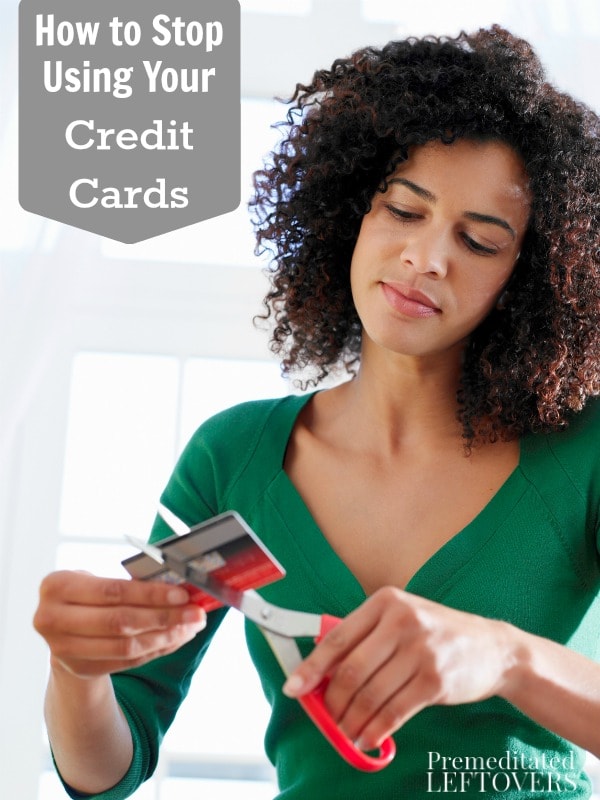Don’t get stuck in a never-ending cycle of credit card debt. Here are 6 money savvy tips on How to Stop Using Your Credit Cards.

Did you know that in 2016, the average household had $16,000 in credit card debt alone? This is a huge problem for most people. It’s easy to become reliant on credit cards, but breaking your dependence on them can do amazing things for your finances. Here are helpful tips on How to Stop Using Your Credit Cards and other ways to handle your finances without them.
How to Stop Using Your Credit Cards
Use techniques such as the envelope method for bill-paying and budgeting. The envelope method is simply having several envelopes that are labeled with things like ‘electricity’, ‘groceries’ and ‘entertainment’ that you place cash into in order to pay your bills and visually see money leaving to help yourself develop better spending habits.
Pay in cash whenever you can. For extras like eating out, shopping for fun and entertainment, make a rule that if you don’t have cash for it, you don’t use a card. Instead, you simply don’t spend the money.
If your debtors won’t accept cash, get a secured card or a debit card that you can add cash to.This is something I do to pay bills that require a card. A secured card can actually help you continue to repair and build credit while just simply paying your bills.
Keep one credit card for some bills. You may also choose not to get rid of all cards because some things almost require payment by card, but you should keep a card that you will ONLY use for bill paying purposes and keep it in a spot that is not easily accessible when you are out and about so you aren’t tempted to use it for other purposes.
After cutting up your cards, pay them off in a way that will motivate you to do so. Some suggest paying off your cards from highest interest to lowest. I personally find this most motivating and to me it makes the most sense when it comes to saving money on interest. Dave Ramsey suggests that you pay off cards in order of smallest balance to largest so you can feel those victories sooner. Whichever way works for you is fine as long as it motivates you to pay them off.
Don’t necessarily cancel your cards when they are paid off. This won’t help your credit to do so. Instead, keep them open and use them for small bills in the future that you will pay off each month. Keeping your cards active is also important for building or re-building your credit.
Are you looking for ways to save money? Check out these 52 small changes that will help you save more money this year. Don’t forget to Join the Facebook group to keep yourself accountable and discover more ideas for saving money.
More Ways to Reduce Debt:
Tips for Getting Debt Under Control

Lindsey Mozgai says
We do an envelope for everything except bills, groceries, and gas. It’s helped us from spending blindly and going over budget.
Elaine says
When thinking about using my credit card, I consider if the item is a need or a want.
This has really reduced my habit of spending on items that will just sit around and take up space. This has really helped me cut down on the use of credit cards.
Also, shopping at some high end thrift shops has afforded me purses and clothes at great bargain prices, especially since the items are gently used. So I guess these items are leftovers for lucky me! When items are “on sale” do I really want to spend spend $50 to save $10? Then I donate these items to other relatives, especially the purses, to younger relatives or friends. Also, I keep a box handy for the donations to charity. Being retired, I have learned that less is really more!
Elaine says
Also, I keep my credit cards in a little recipe box and I only carry one card at a time. This way I have been able to pay off all my cards monthly except for a couple of deferred interest cards for a sewing machine, and a snow blower for a gift to a child.